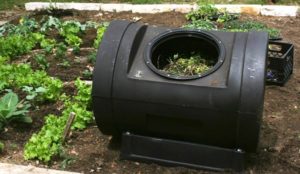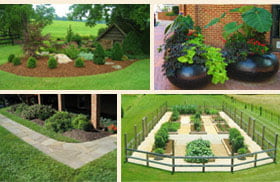Compost: Ready-Made or DIY?
There is a lot of discussion among gardeners these days about the benefits of making your own compost rather than buying compost from a landscape supplier, and you may wonder whether or not you should try creating your own. There are pros and cons to DIY compost, and not all gardeners will benefit in the same ways. Understanding how compost is created, what you need to make it, and how much you can expect to produce can help you decide which decision suits you.
There are some good reasons to compost that aren’t necessarily about your garden. Compost can be a great way to use kitchen and garden waste and keep it out of landfills. It is important, however, to note that compost can’t include everything. Garden waste and plant materials such as pine needles, grass clippings, fallen leaves, brush and branches are good bases compost. Likewise, you can add fruit and vegetable scraps from the kitchen, egg shells, tea bags and even coffee grounds. Most paper products are also safe.
Meat, oils, fats, bones, fish and other animal products should not be added to your compost, which means that in order to use household waste in your compost, you will need to separate your garbage. Furthermore, all food products, even those that are safe to leave in your compost like egg shells, fruit and vegetable peels, can attract animals and encourage them to think of your compost as a food source. You will need to monitor your compost and keep it a safe distance from your home to prevent attracting unwanted pests, like possums, feral cats, and even bears.
It is also important to balance your compost. Compost made entirely of leaves and grass clippings will not be as effective as a blend that includes protein and nutrient rich kitchen waste. Good compost also often contains manure, which is unpleasant to collect and handle, and can make your compost smelly while it is maturing. Compost that lacks these nitrogen rich materials will not be able to create the enzymes plants crave.
 Not all your compost materials will decompose at the same rate, so you will want to “stir” your compost regularly to makes sure that it does not become too dense or too wet. This can be done in a variety of ways: you can use a rake or a hay fork to periodically mix and “fluff” your compost within the composting area, or you can buy a tumbler or make a container from a plastic bin which will allow you to rotate the material as it decomposes. Plastic containers and tumblers can help prevent water from collecting at the bottom of your compost, but also limit the amount of compost you can produce.
Not all your compost materials will decompose at the same rate, so you will want to “stir” your compost regularly to makes sure that it does not become too dense or too wet. This can be done in a variety of ways: you can use a rake or a hay fork to periodically mix and “fluff” your compost within the composting area, or you can buy a tumbler or make a container from a plastic bin which will allow you to rotate the material as it decomposes. Plastic containers and tumblers can help prevent water from collecting at the bottom of your compost, but also limit the amount of compost you can produce.
You need to monitor the temperature of your compost and keep out unwanted water, so it is important to create a composting area that will be able to maintain heat and stay relatively dry. Make sure your container is properly sized – if your container is too large, it will be difficult to stir the compost and keep it properly rotated. If the container is too small, it will be hard to get the decomposition process started and will take longer for the compost to “finish”.
In order to create enough compost for all your needs, you may need several containers. Assess your compost usage several months before the planting season. If you have a large yard with several flower beds or a substantial vegetable garden, you may need quite a few containers. You may need to stack bins or buy large tumblers to save space on your property. You will also want to check with your HOA or neighborhood association to make sure they allow composting on your property.
Making your own compost can be a great way to dispose of kitchen and garden waste and use them to enrich your potting soil for indoor gardening, but often it is difficult to create the amount of compost needed by the average property owner. Fortunately there are many high quality ready-made compost options available to augment your efforts, allowing you to dispose of trash in an environmentally friendly way without sacrificing the beautiful results obtained from property-wide compost use.
Rose Hauling offers three varieties of ready-made compost the help you fulfill your composting need without dedicating a large portion of your home or yard to composting. You can use your homemade compost for new plantings while and nourish your garden with ready-made compost when you need larger amounts. Visit our compost page to learn more about what we have to offer!

 Not all your compost materials will decompose at the same rate, so you will want to “stir” your compost regularly to makes sure that it does not become too dense or too wet. This can be done in a variety of ways: you can use a rake or a hay fork to periodically mix and “fluff” your compost within the composting area, or you can buy a tumbler or make a container from a plastic bin which will allow you to rotate the material as it decomposes. Plastic containers and tumblers can help prevent water from collecting at the bottom of your compost, but also limit the amount of compost you can produce.
Not all your compost materials will decompose at the same rate, so you will want to “stir” your compost regularly to makes sure that it does not become too dense or too wet. This can be done in a variety of ways: you can use a rake or a hay fork to periodically mix and “fluff” your compost within the composting area, or you can buy a tumbler or make a container from a plastic bin which will allow you to rotate the material as it decomposes. Plastic containers and tumblers can help prevent water from collecting at the bottom of your compost, but also limit the amount of compost you can produce. 